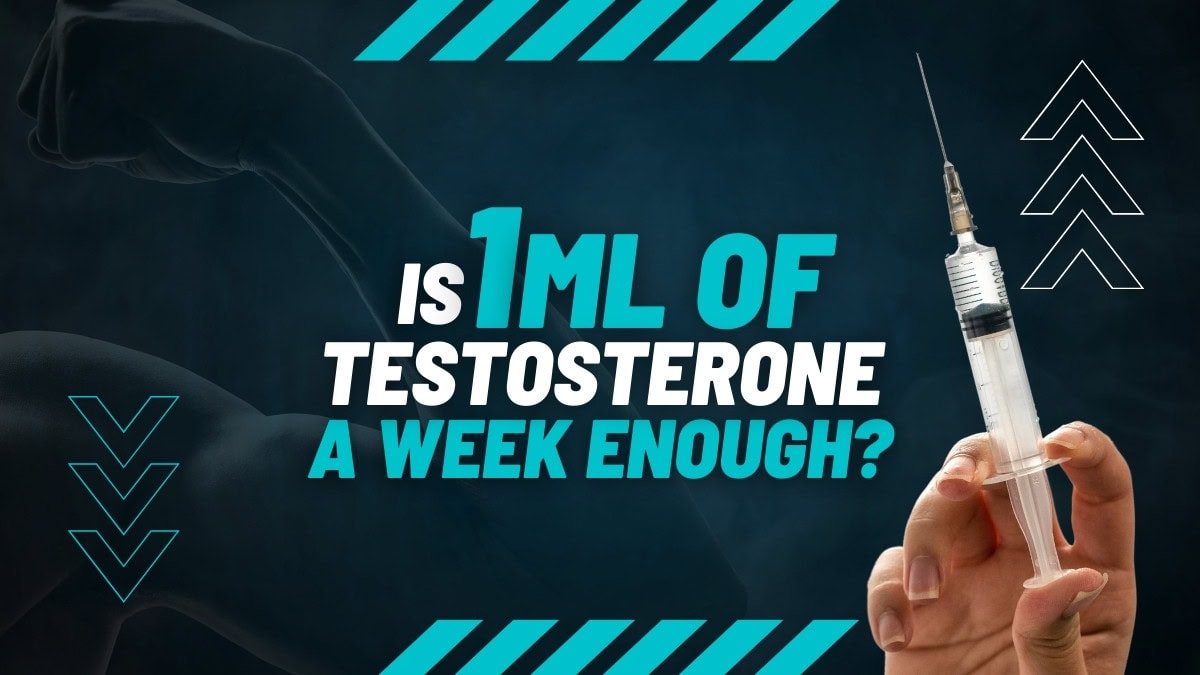
Testosterone is crucial to men’s health, as it plays a big role in their vitality and other crucial functions.
Testosterone also plays an important role in women’s health by supporting bone density, libido, mood, and muscle maintenance. However, it is especially critical for men, as it’s the primary male sex hormone responsible for muscle growth, energy, sexual function, and overall vitality, making it a key factor in male health and well-being.
Your body starts to make less of this hormone as you get older. This could lead to tiredness, muscle mass loss, less strength, poor sex drive, and mood swings.
Testosterone injections are growing more popular thanks to their benefits, but they are not without risk.
So, what’s the right amount of testosterone you should take to revitalize your well-being while minimizing the associated risks? Is 1 mL of testosterone a week enough? Better yet, how much is 1 mL of testosterone, and what does it do to your body?
Keep reading to get all the answers you need!
Understanding Testosterone Dosage
Answering the question “How many mL of testosterone should I take a week?” involves both medical testing and personal evaluation.
Your doctor will ask about your symptoms, lifestyle, stress levels, mood, alcohol use, and diet to understand how you’re feeling and what might be affecting your hormone balance. At the same time, blood tests will provide a clear picture of your actual testosterone levels and whether you’re deficient.
Together, these insights help shape a personalized treatment plan. From there, your progress will be monitored regularly to ensure the therapy is effective and adjusted as needed for the best results.
What Does 1 mL of Testosterone Contain?
Most injectable forms of testosterone contain the natural male hormone bonded to an ester, such as cypionate or enanthate, which helps control how slowly the hormone is released into the body [1].
This esterified testosterone is dissolved in a carrier oil like cottonseed or sesame to allow for intramuscular injection. To ensure sterility and stability, benzyl alcohol is included as an antimicrobial agent, while benzyl benzoate may be added to improve solubility and reduce injection viscosity.
Why mg Matters More Than Volume
Milligrams (mg) are more important than volume because they represent the actual amount of testosterone you’re receiving. Milliliters (mL) simply measure the volume of the liquid solution that contains the testosterone. Since different formulations have different concentrations (like 100 mg/mL or 200 mg/mL), the volume alone doesn’t tell you how much testosterone is in your dose, but the mg does.
Is 1 mL per Week Enough?
There is no one-size-fits-all answer to the question. Testosterone replacement therapy (TRT) is based on several factors such as the condition, needs, and goals of the patient.
The ultimate goal of TRT is to remove any deficiency and improve the patient’s quality of life. It’s known to provide various health benefits, such as boosting muscle growth, bone density, libido, and erectile function; it may also increase sperm count [2].
Signs You Might Need a Different Testosterone Dose
TRT is a trial-and-error procedure by which your doctor will attempt to tailor your dose to precisely fit your body’s needs. Adjustments can also be made based on how long testosterone boosters stay in your body.
When Your Dose Is Too Low
One indication your TRT dose may be too low is if your diagnosed symptoms persist despite receiving the injections. Such symptoms can include:
- Fatigue and low energy
- Reduced sex drive and erectile dysfunction
- Mood changes
- Inability to build muscle or loss of muscle mass
- Difficulty with concentration and memory
- Brain fog
When Your Dose Is Too High
On the other hand, some signs your TRT dose may be too high are:
- Development of acne
- Aggressiveness or an increase in risk-taking behaviour
- High blood pressure
- Low sperm count
- Prostate enlargement
Importance of Regular Blood Tests
Everyone responds to TRT differently, especially when it comes to how it increases their testosterone levels. To ensure you are receiving the proper dosage and to monitor any potentially concerning side effects, it’s a good idea to take regular blood tests under your doctor’s supervision.
How To Collaborate With Your Doctor
While receiving TRT, it is crucial to form a working partnership with your doctor. Aim for open and honest communication, pay attention to details, and strictly follow the protocols.
Some important things to remember during your TRT therapy are to:
- Maintain regular check-ups to monitor your progress
- Pay attention to and report any symptoms you may experience
- Be honest about any side effects you are having
- Strictly follow your treatment plan
- Be patient, as it can take time to experience results with TRT
Risks of Self-Medicating
Keep in mind that TRT is a prescription medication that can carry serious risks if you are considering using it without a doctor’s supervision. Let’s look at some of the potential complications that may arise from self-medicating with TRT.
Cardiovascular Issues
TRT can raise your red blood cell count. In turn, this may increase blood viscosity (thickness), thereby raising the likelihood of blood clots and potential stroke or heart attack [3]. What’s more, folks with heart conditions might worsen their condition by self-medicating with TRT.
Prostate Issues
TRT can stimulate prostate growth and worsen symptoms of benign prostatic hyperplasia (BPH) [3]. Although the jury is still out on this, there is also a possibility that TRT may increase the growth of prostate cancer if you currently have it.
Fertility Issues
Elevated testosterone levels can reduce the body’s natural testosterone production and lead to lower sperm production and infertility [3].
Other Side Effects
Engaging in DIY TRT might also result in worsening sleep apnea, increasing the risk of liver damage, causing acne and other skin eruptions, and leading to male breast enlargement [3].
A safer, legal alternative to illegal TRT self-medication is a testosterone supplement. How long do testosterone pills take to work? Most folks usually take a few weeks to a few months to see results from T-boosters. While they don’t work as fast as TRT, supplements involve a lower risk of side effects.
Expert Insights
Wondering what the experts think about testosterone therapy and how it boosts this male hormone?
Two researchers from the School of Medicine of the Catholic University of Daegu revealed that testosterone may help improve cognitive function and reduce depression symptoms in men diagnosed with TDS (a.k.a. testosterone deficiency syndrome). In the study, they used an injection with 1,000 mg of testosterone undecanoate [4].
Together with his team, a researcher from Charles R. Drew University of Medicine and Science concluded that the benefits of TRT may depend on the dose. For instance, the clinical trial involved weekly injections of 25, 50, 125, 300, or 600 mg of testosterone enanthate, which had varying effects on fat-free mass and strength [5].
Different members of the community have different views about TRT as well. You can read about Redditors’ varying opinions and experiences on testosterone treatments in online discussions.
If you prefer natural solutions, you can also explore discussions on testosterone alternatives on r/Supplements to learn how to increase testosterone with supplements.
FAQs
Still have other questions about testosterone dosage? Let’s answer some of them below!
How Many mL of Testosterone Should I Take a Week?
Because it is a prescription medication, the amount of testosterone you take a week should be determined by a qualified healthcare provider who has done the necessary tests. Attempting to dose yourself with TRT is illegal and can lead to possible adverse effects on your health.
Is 1 mL of Testosterone a Week Enough To Build Muscle?
For some people, 1 mL of testosterone a week can help them raise their T-levels and build muscles, yet the efficacy of a dose depends on its concentration and the needs of each individual. Talk to a medical professional to determine what your personal dosage of TRT should be.
Is 2 mL of Testosterone a Week Too Much?
A study shows that 125 mg per week of injected testosterone was enough to increase the muscle mass in healthy young men [4]. Two mL of testosterone a week would be equivalent to around 400 mg per week. While this may raise low testosterone and increase muscle mass, it might also thicken the blood, cause water retention, and elevate blood pressure.
How Much Testosterone Do Bodybuilders Use a Week?
The ideal TRT dosages will be based on the person’s current testosterone levels, bodybuilding goals, and how their body responds to treatment. The doses of TRT for bodybuilders generally range from 100 mg to 400 mg per week.
How Much Will 1 mL of Testosterone Raise Your Levels?
It depends on your exact dosage. Typically, 1 mL of testosterone may deliver between 100 mg to 200 mg of testosterone to your body.
Is 1 mL of Testosterone a Week Enough for a Woman?
Women generally need less testosterone than men, but the amount required may vary based on each lady’s health condition and needs. For instance, some suggest a starting dose of 0.5 mL (instead of 1 mL) for menopausal women.
Conclusion: Is 1 mL of Testosterone a Week Enough?
In our guide, we exhaustively talked about the possible effects of taking 1 mL of testosterone a week and the associated benefits. At the end of the day, it’s up to you and your doctor to figure out the answer together and determine the right amount to help boost your health and well-being!
 11 Niche Experts
11 Niche Experts
 100+ Product Reviews
100+ Product Reviews
 50+ Tested Products
50+ Tested Products
At BestDaily, our mission is simple: to help you make confident, informed decisions about the products that impact your daily life. Whether you're searching for wellness essentials or lifestyle upgrades, we combine hands-on testing with expert analysis to highlight what truly works.

